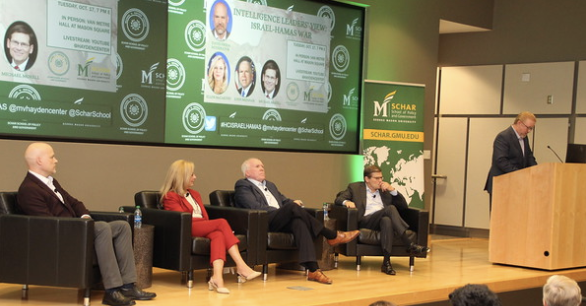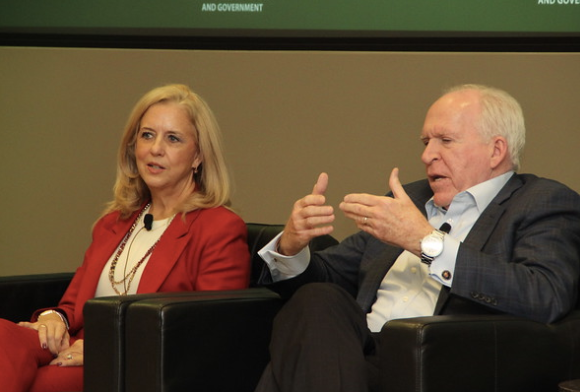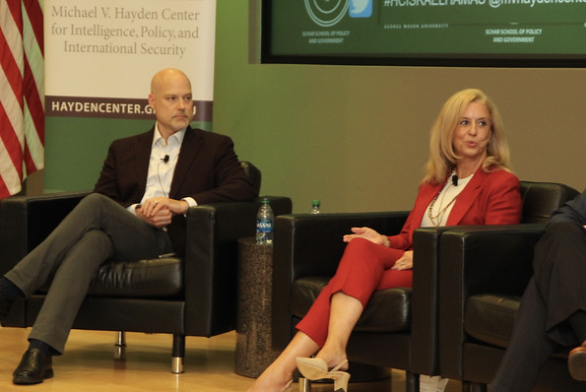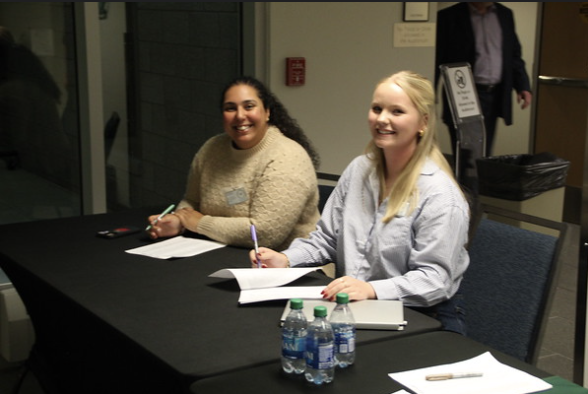EMERSON MATTIE
On October 17th, 2023, the Michael V. Hayden Center for Intelligence, Policy, and International Security at George Mason University’s Schar School of Policy and Government hosted former leaders from across the U.S. Intelligence Community to discuss their assessment of the Israel-Hamas War. The panel included moderator David Priess, Director of Intelligence for Bedrock Learning Inc., and a former Central Intelligence Agency analyst and briefer; Ellen McCarthy, chairwoman and Chief Executive Officer of Truth in Media Cooperative, and formerly Assistant Secretary of State for Intelligence and Research; John Brennan, former CIA Director, Director of the National Counterterrorism Center, Assistant to the President for Homeland Security and Counterterrorism, and intelligence analyst with a concentration in the Middle East and counterterrorism; and Michael Morell, former CIA Deputy Director, twice Acting Director, and President’s daily intelligence briefer. The event began with opening remarks from Schar School Dean Mark Rozell and Hayden Center Director Larry Pfeiffer. General Michael Hayden, former Director of CIA and the National Security Agency, was in attendance.
Priess began by addressing his methodology for approaching the discussion in which he would ask the same questions to each panel member so that the audience could benefit from their rich and varied experiences. Priess started off the questions with a bang by addressing the statement that the initial attack by Hamas was an intelligence failure by Israel. Brennan began his response with a condemnation of the Hamas attacks, calling them “horrific terrorist attacks” with “no rationalization or justification” for the attacks, quoting President Biden, who called it “pure unadulterated evil.” Every panel member concluded that it was an intelligence failure, and Morell went as far as to say that in the world of intelligence, the Israelis were “even better than us.” Furthermore, the panel concluded that even though it was an intelligence failure, we would not know why for a long time.
Priess then pivoted the conversation to what intelligence sharing was happening then. McCarthy argued that it was strongest in a crisis. The panel concluded that there was a robust amount of intelligence sharing, especially between Israel and the United States. This relationship, as Brennan stated, was “second to none,” which significantly contributed to the shift in the intelligence priorities that the panel members said was happening.
The conversation shifted to addressing the post-mortem analysis that needed to be done by the Intelligence Community, with a particular emphasis on re-analyzing intelligence previously gathered in the context of what we know now. Morell stated that the previous raw reporting would be critical in determining what Hamas might do next. To further confirm this statement, Brennan gave credit to Hamas for a “very sophisticated deception campaign” that would also be studied during the post-mortem analysis. Brennan worried that the sophisticated planning was not only for the initial attack but to cause greater havoc in the post-terrorist attack environment.
Piggybacking off the allusion to plans, Priess asked how this attack should be framed. Should it be looked at through the lens of shocking the system, or was a more extensive plan at play? McCarthy described this as the “perfect storm” for mis- and disinformation to be spread by Hamas and other organizations.
Brennan asserted that a militant core of Hamas had taken over and had no interest in the group’s central idea and that “they just wanted to kill.” Brennan even stated that these attacks by Hamas “almost put ISIS to shame.” He suggested that the repercussions of this attack had now put all the Palestinians in Gaza at risk and had made Hamas an illegitimate organization. Morell suggested that Hamas’s motivation for the attack was to disrupt Israel from becoming a “normal” nation in the Middle East.
Priess followed by asking the panel what the Intelligence community needed to do to prepare U.S. policymakers for what was coming. The common conclusion was that U.S. policymakers should prepare for Israel to launch a ground assault on Gaza, with an emphasis that it would be a bloody war. Brennan also stated that a primary goal would be to retrieve the hostages taken during the attack. The fighting would be “closet to closet,” with many expected casualties. Morell said that the biggest priority should be to “stop the spread of the war” and that this was what the intelligence requirements reflected.
Wrapping up, Priess asked how much intelligence played in the ensuing steps. Brennan stated that there must be accountability concerning Iran, even asserting that “Iran empowered Hamas to be able to carry out these horrific attacks.” Morell believed that in the short term, Israel would not “take the first shot” against Hezbollah or Iran but expressed concern for the long term, even suggesting that its reaction may be comparable to the United States’ reaction to 9/11, going into Iraq.
The panel concluded with audience questions discussing various topics relating to the war. To end the night, the panel had a rapid-fire question round, with John Brennan finishing that Israeli intelligence, while conducting its post-mortem analysis, would focus on never being surprised again by what Hamas or Hezbollah may have planned next.
Emerson Mattie is an honors college student majoring in criminology, law, and society with a minor in intelligence studies.
To watch the panel, please visit the Hayden Center YouTube channel at this link: https://www.youtube.com/watch?v=pgdHUu5ZW7E&t=343s






